How to Learn About Digital Photography
 Digital photography is a creative discipline that you can learn without entering a physical photography class.
Digital photography is a creative discipline that you can learn without entering a physical photography class.
But in this era where most career photographers labor to get good-paying projects, is there a need for formal training to remain competitive?
There are so many ways of learning about digital photography.
Apart from learning about your digital camera and watching online tutorials, you can enroll in free or paid courses for more comprehensive courses.
Also, hitting the books is a good idea for avid readers.
Even as you gather the knowledge and tips, it is crucial to keep practicing until you perfect your skill.
Here are some practical ways to learn about digital photography without attending photography school.
1) Familiarize yourself with your Digital Camera
It isn’t about reading your camera manual as you think – yes, there is some information rookies need to know there first, but that is minor.
Try mastering your digital camera regardless of the model.
Skim areas you know on the manual, then research your camera to understand all aspects.
2) Enroll in Online Courses
The internet’s inception has made most people take manuals for artifacts.
You can learn on the internet by enrolling in comprehensive digital photography courses if you are a novice.
There are tons of them on platforms like Udemy, Skillshare, and the likes.
You can first opt for general introductory courses or those specific to your camera model.
Here’s the good news: Online courses are affordable, flexible, and you can complete them at your pace.
They free you from the bondage of paying heftily for physical classes that don’t cover as much and the consequences of school and class discrepancies.
3) Use Online Tutorials and Posts
So many photographers have been in the industry for a while.
These buddies have used rigs exactly or similar to use before and have their reviews out there.
YouTube is full of tips, warnings, and reviews for photographers.
You can check out some popular channels like Peter McKinnon or Mango Street, among others.
They have easy-to-follow videos.
As usual, remember to action what you watch!
4) Comb the Books
Read good photography books or online portfolios for those who find reading creative, interesting, and colorful.
Such books are inspiring and help you figure out the niches you can experiment with before specializing in specific ones.
While learning, portfolios can bring immense frustration when looking at others’ achievements and struggling to mirror them.
Let it not demotivate you because every good form of art takes time and practice to master.
5) Practice makes Perfect
Whoever said this meant it. Only experience will help you more than anything else.
Bring your digital camera with you everywhere and capture anything interesting.
You can pay for 100 photography courses, have the best mentor ever, read the most expensive photography book, but taking pictures is what will help you unlock your natural skills and style.
As you build on your photo collection, you will spot areas that need improvement.
6) Networking is Key
Reading, researching, and practice works, but networking works wonders!
Hit these streets and expand your networks.
Through referrals and contacts, you can gain valuable knowledge and skills, then once you are ready to go for the bucks, get clients.
7) Mentorship and Apprenticeship
Most people overlook the need for a mentor or an apprenticeship since they think it isn’t a way of pacing into photography.
Most renowned self-taught professional photographers will attest to learning the ropes and climbing the ladder in internships.
A big tip: Research anyone or companies you will be taking your internship for.
It would help if you connected with a knowledgeable and generous person.
8) Attend Workshops
Attending photography workshops is another excellent way of learning.
These are great for rookies who want to learn the skill but can’t commit to over three years of studying and shelling out their life savings.
It doesn’t mean that workshops are free. Some can be eye-watering, but it is a great bargain when compared with a degree in photography.
Workshops, besides learning, are suitable for practicing, networking, finding mentors and apprenticeships, and identifying niches or styles, you love.
9) Join Photography Forums
Photographers often talk about photography, and you will find them unleashed in forums.
You could be in dire need of honest feedback on projects you have worked on, or want to know certain aspects of a new style, or need help with a camera issue; most often, forums will have all the help you need.
But, avoid taking everything you read from forums as the gospel truth.
It helps to back up a claim with more research.

10) Try a Photography Must-do or Bucket List
Writing challenges and working to achieve all of them is fun – these aren’t like your New Year resolutions that you will never work towards achieving.
Your new journey will benefit from a bucket list, and you will be more motivated to step out, shoot, and complete one challenge after the other.
11) Enter Photography Competitions
Photography contests and competitions are fantastic for getting feedback on projects you have done, especially if you can’t get critiques elsewhere.
Some competitions can be awarding hefty prizes to winners. So, if you want to try earning from your shots, sign up for them.
But, be woke – Most photography contests are more of money-making schemes for hosts than ways of celebrating talent.
Research the competition and never pay any exorbitant entry fees.
12) Share your Work with Friends and Family
Feedback is essential when learning new skills.
Get honest friends to look at your work and give their feedback but remember they might not know photography styles or techniques.
Know those that they like and those they don’t and why.
You might get great pointers to reflect upon from their feedback, and it helps you relate to how future clients might view your projects.
13) Identify your Style
Something crucial to know when learning digital photography is an inspiration and not being a copycat.
True, you can’t see your mentor’s photo and feel that it is the exact one you should take, but there have never been two same photos.
Avoid mirroring others to the tiniest detail.
Keep taking great photos if you want to develop your style – do it anytime, anywhere until you get it right.
14) Keep the Hustle
Digital photography is like a game, and its secret ingredient for anyone who wants to win is hustling.
People like Eric Kim have been in the field for decades.
He believes in working harder through studying, researching, and practicing.
Put more hours into snapping and creating stuff.
Take risks and put yourself out for the world to notice you, then learn how to create your brand and market it.
Once you are at the right place and time, you can get a lucky break.
You could also meet the right people or connections, and that is it.
Luck is uncontrollable, but you can control the hustle.
15) Follow Great Photographers Online
Social media is one of the most incredible tools for any photographer – especially Instagram –since it favors eye-catching imagery.
If you spend more time trawling your feeds, make what comes up inspire you.
Some fantastic photographers to follow are Scott Schuman, Jussi Ulkuniemi. Simone Bramante, Theron Humphrey, and Adam Senatori, among others.
16) Explore
Exploring will push you creatively out of your usual schedule and comfort zone.
Every time you hit the roads, bring your digital camera and shoot what interests you.
Your memory car will have lots of lessons and souvenirs, especially if you are a newbie.
Instead of taking photos of moving objects or models, begin with beautiful landscapes.
17) Learn to use your Tools
Taking photos is a thing on its own, just like editing them is.
Well, you can take perfect photos that need no editing. However, this happens once you have mastered your craft.
Learn how to use manipulation programs like Photoshop, GIMP, and Lightroom.
Photo editing catapults your skill to a higher level.
18) Make Mistakes
I love memory cards because you can take thousands of photos and store them in, and you will be nowhere closer to exhausting the storage.
And the beauty of photography is that you choose how to take your images.
Take pictures from every angle, play with light, experiment with the subject, and do all you can.
You might find one or two good photos out for all you take as a beginner, but the crucial thing is to get what works and what doesn’t.
19) Let Passion Lead You
If you are passionate about photography, you will apply the passion to each photo.
Photography as an art has the best shots coming from a passionate place!
Wrap Up on How to Learn About Digital Photography
Very few can take their hobbies and flip them into careers.
Enrolling to study photography in a physical school has its pros and cons.
Weigh the importance of self-learning and the former and if you feel a solid intuition to do this without dropping big bucks, get on to it!



